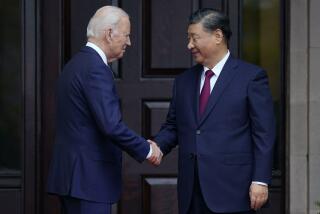Denied State Visit, China’s President to Meet Clinton in N.Y.
- Share via
WASHINGTON — The Clinton Administration, after refusing to grant Chinese President Jiang Zemin a formal state visit to the White House, agreed Monday to a summit between President Clinton and the Chinese leader in New York City later this month.
Secretary of State Warren Christopher announced that Clinton and Jiang will meet Oct. 24 in New York, where both men will be attending ceremonies marking the 50th anniversary of the U.N. Security Council. It will be the first summit-level meeting between the nations since Clinton permitted Taiwanese President Lee Teng-hui to make an unprecedented visit to this country last spring, souring relations between Washington and Beijing.
Chinese leaders had been pressing hard for the full regalia of a state visit--including red-carpet ceremonies for Jiang’s arrival, a White House banquet, flags flying on Pennsylvania Avenue and a 21-gun salute. Neither Jiang--who is both president and Communist Party leader--nor Premier Li Peng has visited the White House since China’s 1989 crackdown on pro-democracy demonstrations.
“It was overreach,” Douglas Paal, the China specialist on former President George Bush’s National Security Council, said of the request for a state visit. “Why did they overreach? They were trying to trump Lee Teng-hui, and also maybe trying to reinforce Jiang Zemin’s position at home, and maybe trying to get Jiang to be treated as he is on other foreign trips.”
During his 1992 campaign for the presidency, Clinton attacked Bush for not being tough enough in his dealings with Chinese leaders. If Clinton had granted Jiang the honor of a state visit, Republican leaders would almost certainly have subjected him to the same sort of criticism in return.
Administration officials had offered Jiang the possibility of a more subdued “working visit” to Washington, in which the Chinese president would have been welcomed to the White House without the accouterments of a state dinner and other ceremonies. But China insisted that any Washington trip should be a state visit, and the Clinton Administration refused to back down. Both sides then settled on a New York summit instead.
“We don’t believe that our bilateral relationship [with China] at the moment is at a sufficient state of progress to warrant a state visit,” White House Press Secretary Mike McCurry said Monday.
China took the Administration’s rejection with lofty equanimity. In Beijing, Foreign Minister Qian Qichen said that if the White House lacked the “political will” to invite Jiang for a state visit, China would accept a meeting in New York.
“I’m relieved that there will be no White House meeting,” said Mike Jendrzejczyk, director of Asia Watch, a leading human rights organization. “I think the Oval Office should, for the time being, remain off limits to China’s president. But I’m disappointed that even the New York meeting has not been used as leverage for progress on human rights.”
Jendrzejczyk said he hopes Clinton will use his talks with Jiang to press for the release of imprisoned Chinese dissidents, for legal reforms and for a reduction of repression in Tibet.
At the summit, Jiang is likely to press Clinton for a lifting of the remaining U.S. sanctions imposed on China in 1989. These include a ban on sales of military equipment to China; a freeze on the Overseas Private Investment Corp. program that guaranteed loans for American businesses in China, and a freeze on the federal program to develop trade between the United States and China.
Over the weekend, Qian told Chinese reporters in New York that the United States had agreed to new restrictions on future visits by Taiwan’s leaders, barring them from making political speeches while they are in this country.
In recent months, Administration officials have promised that visits by Lee and other top Taiwanese officials will be permitted only rarely, for personal reasons.
But the White House and State Department strongly denied Monday that they had agreed to curb Taiwanese leaders’ right to make speeches.
“To limit a person’s freedom of speech is contrary to American values,” McCurry said.
More to Read
Sign up for Essential California
The most important California stories and recommendations in your inbox every morning.
You may occasionally receive promotional content from the Los Angeles Times.













